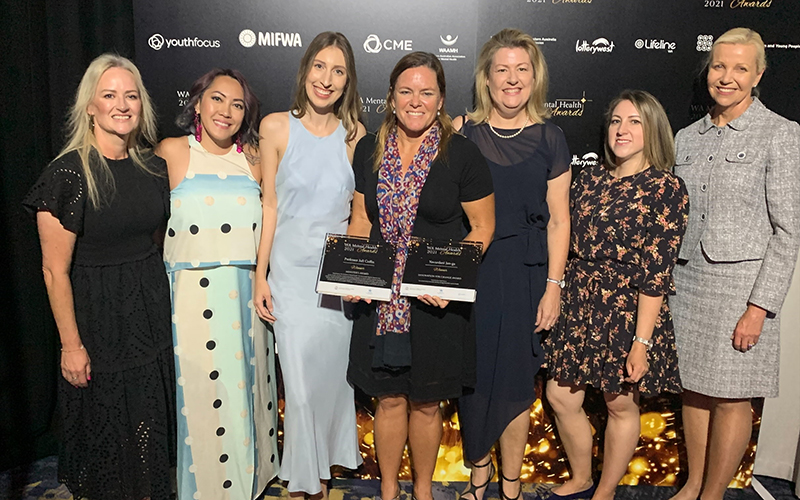Search
Showing results for "Au"

News & Events
WA Near Miss Awards provide boost for leading researchers at The KidsNine researchers from The Kids Research Institute Australia have secured vital support through the WA Near Miss Awards, allowing them to continue innovative health projects that narrowly missed out on national funding.

News & Events
Innovative mental health researcher takes top prize at WA Mental Health AwardsOutstanding Aboriginal mental health researcher Professor Juli Coffin has taken out top honours at the 2021 Western Australian Mental Health Awards in recognition of her ground-breaking work to enhance Aboriginal social and emotional wellbeing.
Research
STopping Acute Rheumatic Fever Infections to Strengthen Health (STARFISH)STopping Acute Rheumatic Fever Infections to Strengthen Health (STARFISH) brings together a diverse and multidisciplinary research team to investigate the most effective environmental health initiatives (EHIs) aimed at reducing Strep A infections and prevent Acute Rheumatic Fever (ARF).
Research
Aboriginal Urban Healthy Skin studyAsha Brad Glenn Jonathan Marianne Tim Bowen Farrant Pearson Carapetis AM Mullane Barnett BA MBBS DCH FRACP PhD GAICD FAHMS OAM BSc (Hons), PhD BA (
Research
Accelerate-WA Network: Developing a sustainable family-clinician-researcher network for education and training in the early detection of cerebral palsy for all infants in Western AustraliaAccelerate will develop and pilot, a multi-directorate teaching and training network for early detection of cerebral palsy (CP), encompassing key clinical partners across CAHS and WACHS.

Research
Acute Rheumatic Fever Diagnosis Collaborative Network (ARC)ARC is a global network of collaborators committed to reducing the burden of RHD in our lifetime.
Research
Host-dependent resistance of Group A Streptococcus to sulfamethoxazole mediated by a horizontally-acquired reduced folate transporterDescribed antimicrobial resistance mechanisms enable bacteria to avoid the direct effects of antibiotics and can be monitored by in vitro susceptibility testing and genetic methods. Here we describe a mechanism of sulfamethoxazole resistance that requires a host metabolite for activity.
Research
Modes of transmission and attack rates of group A Streptococcal infection: a protocol for a systematic review and meta-analysisSummarising the current knowledge of Strep A transmission to humans will address gaps in the evidence and inform prevention and control strategies. The objective of this study is to evaluate the modes of transmission and attack rates of group A streptococcal infection in human populations.
Research
Perinatal risk factors associated with skin infection hospitalisation in Western Australian Aboriginal and Non-Aboriginal childrenWe have quantified the relative influence of perinatal risk factors associated with skin infection hospitalisations in WA children
Research
Establishing the lowest penicillin concentration to prevent pharyngitis due to Streptococcus pyogenes using a human challenge model (CHIPS)The in-vivo plasma concentration of penicillin needed to prevent Streptococcus pyogenes pharyngitis, recurrent acute rheumatic fever, and progressive rheumatic heart disease is not known. We used a human challenge model to assess the minimum penicillin concentration required to prevent streptococcal pharyngitis.
